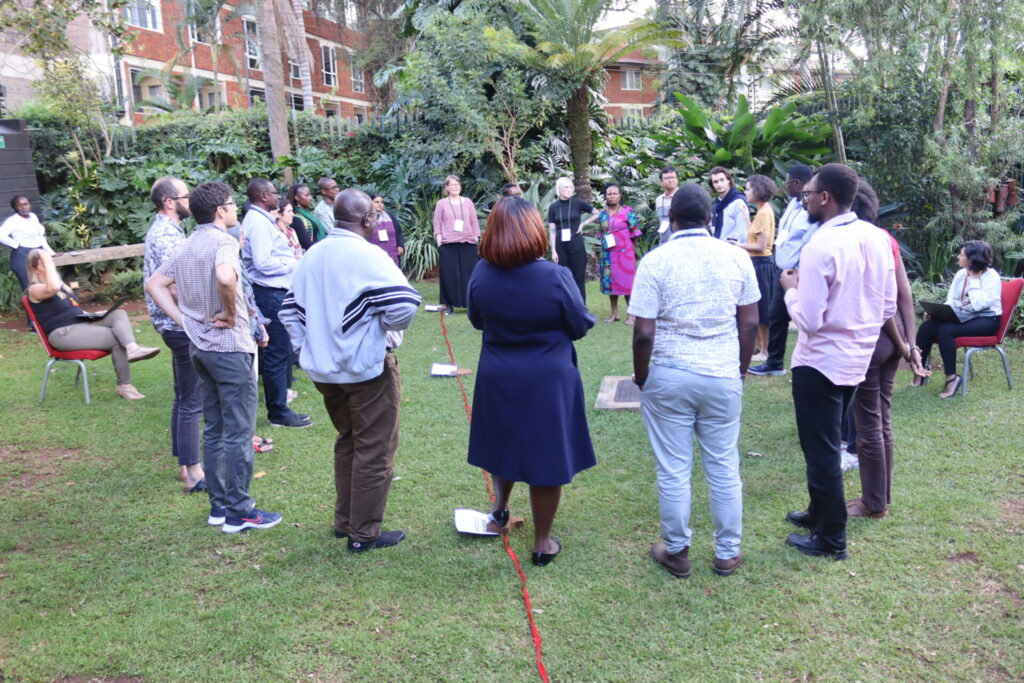
Creating Safe, Inclusive Co-Creation Spaces: Insights from the BIMA Project
/
Authors: Maureen Kabasa, Salome Okoth, Joel Onyango
Co-creation process
Capacity strengthening for climate action is not only limited to traditional skill development. Instead, it encompasses a broader vision—one that centers on the co-creation of knowledge and the enrichment of the entire ecosystem supporting climate change mitigation and adaptation efforts. This approach is informed by the recognition that climate challenges are multifaceted and transcend disciplinary boundaries and are multiscale (Reed et al., 2016). In addition, this approach aligns seamlessly with the principles of participatory action research, a methodology increasingly lauded for its efficacy in addressing complex societal challenges (Creswell et al., 2018). By emphasizing active collaboration, inclusivity, and the convergence of diverse perspectives, knowledge co-creation within the framework of capacity strengthening sets the stage for innovative solutions and transformative adaptation to climate change.
However, the goal stretches far beyond the acquisition of knowledge and the cultivation of capabilities. It aspires to instill self-mobilized capacity strengthening with the vision of empowering individuals, communities and organizations not merely to respond to climate change but to proactively drive initiatives that ignite meaningful societal impact.
Co-Creation in Practice

ACTS Media Team, Knowledge Brokering Workshop-Nairobi, Kenya (2024)
Co-creation is an effective method for fostering more immersive knowledge brokering. When implemented correctly, it facilitates the inclusion of diverse perspectives, shaping knowledge collaboratively and fostering co-ownership, which enhances the likelihood of stakeholders acting on the insights gained. A key illustration of co-creation was the knowledge brokering workshop held from May 13th to 16th May 2024 in Nairobi. This workshop was conducted in partnership with the Research for impact (R4I) hub, South South North, CDKN, the CS hub represented by ACTS and Plan Adapt. Participants from various projects within the R4I and CS hub attended.
The participants began the day with a painting exercise, using a single color to represent their project’s vision. Next, participants co-created new artwork with partners from different projects, emphasizing the importance of collaboration. Co-creation requires trust, inclusion and an understanding of diverse contexts. The projects represented appreciated the integration of diverse groups and stakeholders by gender, age, social standing and capability in the process to enhance ownership across varying contexts. Co-creating throughout the project cycle to align interest, role and design community-owned initiatives was a key takeaway.
The BIMA project aims to develop livestock insurance that considers gender norms and community needs, creating safe and inclusive co-creation spaces is essential. By considering gender concerns, equal participation, and marginalized groups’ needs, the project fosters effective collaboration and meaningful outcomes. Through a world café discussion with different projects, some strategies were highlighted for consideration in the implementation of different projects that can contribute to gender transformative solutions and impacted communities.
Strategies for Safe and Inclusive Spaces
Objective Alignment: From the ideation stage, setting objectives that address concerns of different gender, age and physical and mental ability is core to guide inclusive activities and contextual decision making.
Mapping Stakeholders: Identify key organizations and stakeholders who can champion gender, persons with disabilities and other vulnerable groups’ integration.
‘Women grassroots organizations can serve as entry points to communities.’ Representative from the WOSFER project.
Need Assessment: Understand structural and cultural barriers by conducting need assessments for different groups and tailoring solutions based on these insights.
Co-Design with Target Groups: Involve target groups throughout the project cycle, their feedback should shape project decisions substantially. During implementation encourage participation from all age groups, genders, and differently abled individuals, using separate engagement groups if needed for diverse perspectives. The BIMA project working in minority and culturally diverse areas has had to practice some adaptive strategies to amplify vulnerable voices. Additionally, assembling diverse teams enriches problem-solving and creativity.
‘The mistake we do is coming up with solutions that are not designed with and by the community’ RURBANISE project representative
Capacity Strengthening (CS) and informed impact: CS modalities are core for building capability of projects and their stakeholders. A good example from one of the participants was to train champions on gender matters and safeguarding and empower them to share knowledge within communities. Ensuring CS impact requires that project outputs (e.g., livestock insurance) address marginalized groups’ specific needs and recognize communication norms based on age, gender, and social standing (e.g., seniority-based communication in West Africa, economic power held by women in the Philippines).
Key Insights
Context Matters: Gender contexts vary based on social, economic practices and existing historical factors that shape gender dynamics.
Balancing Inclusivity and Safety: Achieving both inclusivity and safety can be challenging. Trade-offs may arise e.g., mixed-gender groups leading to conflict at home (Example from WOSFER project representative).
Recognize Limitations: Co-creation has limitations and acknowledging what can and cannot be achieved within these constraints is key.
Conclusion
Creating safe and inclusive spaces requires intentional efforts, collaboration, and sensitivity. By integrating gender considerations, valuing diverse perspectives, and recognizing contextual nuances, the BIMA project has demonstrated that projects can achieve meaningful outcomes that benefit all stakeholders.
Published
CLARE Projects
CLARE Partners

